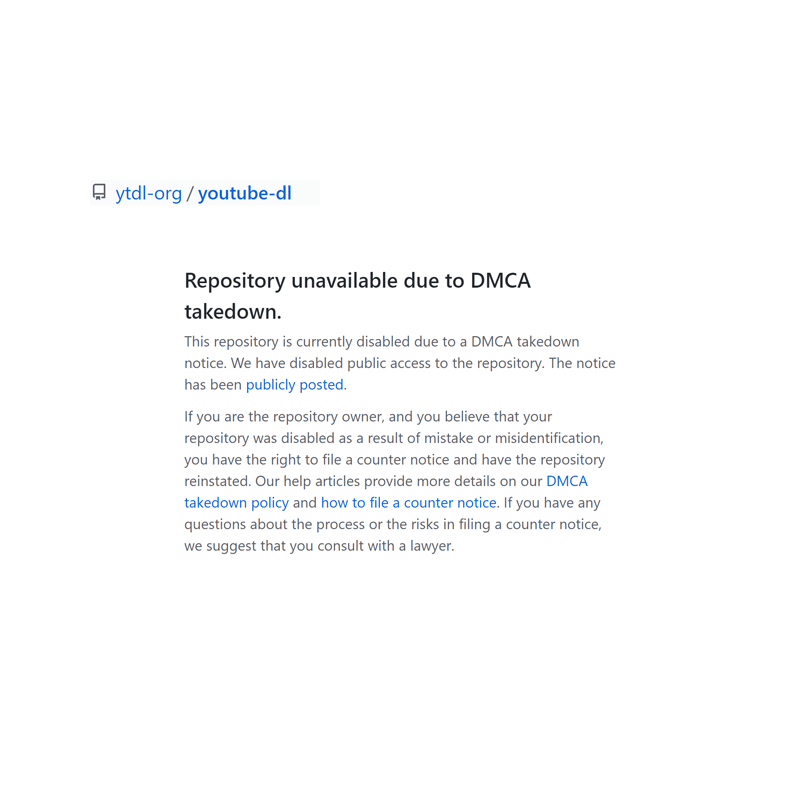
YouTube is the largest video-streaming giant of the web. It has policies users need to obey. But sadly for YouTube, internet users aren't known for their obedience.
Previously, YouTube said that users "shall not download any content unless you see a 'download' or similar link displayed by YouTube on the Service for that content."
That term has been removed, most likely because users are going to disobey it anyway.
After all, there are a lot of tools people can use to download YouTube videos. Most of them are free, and can come in the form of a browser extensions, third-party apps, desktop apps, and more.
And one of the most popular YouTube video downloader of them all, is the 'YouTube-dl', the command-line tool to download videos from YouTube and some other sites.
As of October 2020, the tool is one of the most starred projects on GitHub, with more than 72,000 stars.
While it has lots of happy users, not everyone is happy.
Aside from YouTube, it's the Recording Industry Association of America, Inc. (RIAA). The organization that represents record labels, issued a DCMA takedown notice to GitHub, the platform where the tool's source code is hosted.
RIAA argued that the YouTube-dl repository used technology that violated section 1201 of copyright laws to obtain licensed content illegally.
The notice also said that the tool’s developers have used several copyrighted songs from artists like Taylor Swift, Justin Timberlake, and Charlie XCX as examples of the content users can download from YouTube.
RIAA also cited a ruling from a German court that favors the takedown.
As a result of this notice, the code hosting site GitHub had no choice but to take down the multiple repositories RIAA asked it to do.
But this quickly angered GitHub users. Many developers and activists said that the tool was meant to download videos from the government and other resources could use under creatives common licensing.
Other prominent entities also have words to say about this RIAA's inquiry. And this includes the Electronic Frontier Foundation (EFF), an international non-profit digital rights group that defends civil liberties in the digital world.
Youtube-dl is a legitimate tool with a world of a lawful uses. Demanding its removal from Github is a disappointing and counterproductive move by the RIAA. https://t.co/VUbTokd4cP
— EFF (@EFF) October 23, 2020
In a press release, the Freedom of the Press Foundation, which protects and defends adversarial journalism, described how various journalists used the tool in different ways ranging from fact checking to gauge the reach of conspiracy theories.
The non-profit organization also said that a lot of journalists used the tool to download videos for transcription of interviews.
Angering many people, developers at GitHub retaliated by creating hundreds of new forks of the tool on both GitHub and GitLab.
Security engineer Lance Vick noted that programmers have even exploited a bug to attach the original YouTube-dl source code to GitHub’s repository for DCMA takedowns.
In a tweetstorm, Vick was seen to be vocal and straightforward in his disappointment.
While the community is angry, let's not forget YouTube, the platform that hosts all those video contents in the first place.
YouTube-dl is simply a tool to download YouTube videos without hinderance. The developers of the tool have to continuously face the challenge of keeping up with YouTube's code changes to keep the tool working as intended.
And this takedown case here, may make it difficult for users to know which project to follow, and know what tool to use in order to have the most updated version of the YouTube-dl fork.
Weeks later however, GitHub reinstated the Youtube-dl.
GitHub said that it didn't actually break Section 1201 of the DMCA, citing a letter it received from the EFF. In the letter, EFF explained that Google/YouTube does not have any technical measures in place to prevent anyone from downloading its videos - all of which need to be made freely available to all kinds of apps, browsers, smart TVs, and more.
What this means, YouTube-dl could never be taken down under Section 1201 of the DMCA, since it doesn't actually circumvent any sort of copyright protection system in the first place.
